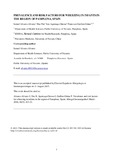Mostrar el registro sencillo del ítem
Prevalence and risk factors for wheezing in infants in the region of Pamplona, Spain
| dc.creator | Álvarez Álvarez, Ismael | es_ES |
| dc.creator | Niu, Hao | es_ES |
| dc.creator | Aguinaga Ontoso, Inés | es_ES |
| dc.creator | Guillén Grima, Francisco | es_ES |
| dc.date.accessioned | 2017-09-09T11:52:19Z | |
| dc.date.issued | 2016 | |
| dc.identifier.issn | 0301-0546 (Print) | |
| dc.identifier.issn | 1578-1267 (Electronic) | |
| dc.identifier.uri | https://hdl.handle.net/2454/25555 | |
| dc.description.abstract | Background: Wheezing in the first year of life affects life’s quality of the baby and the family. Risk factors such as male gender, nursery attending or a family history of asthma, and protective factors such as breastfeeding more than 6 months have been previously described. The aim of this study is to study the prevalence and risk factors for wheezing ever and recurrent wheezing in the first year of life in infants in the region of Pamplona, Spain. Material and methods: This cross-sectional study was part of the International Study of Wheezing in Infants (Estudio Internacional de Sibilancias en Lactantes, EISL). Between 2006 and 2008, participating families answered a standardized validated questionnaire on respiratory symptoms, environmental factors or family issues. An analysis with the chi square test (statistical significance p<0.05) identified the risk factors for wheezing ever and recurrent wheezing, which were assessed using logistic regression. Results: 1065 questionnaires were answered. The prevalence of wheezing ever and recurrent wheezing were 31.2% and 12.3%, respectively. Male gender (p=<0.001), a history of pneumonia (p=<0.001) or nursery attendance (p=<0.001) were some of the risk factors found for wheezing ever. Infant eczema (p=<0.001), nursery attendance (p=<0.001) or prematurity (p=<0.001) were risk factors for recurrent wheezing. No associations with duration of breastfeeding (p=0.116 and p=0.851) or mould stains at home (p=0.153 and p=0.992) were found. Conclusion: The study of prevalence and risk factors for wheezing shows the importance of this public health problem, and allows the development of control and treatment strategies against preventable factors. | en |
| dc.description.sponsorship | This study has been funded by two Research Grants from Carlos III Institute, Spanish Ministry of Health and Consumer Affairs Ref, PI 050918, and from the Department of Health, Government of Navarra, Spain, Ref 6106. | en |
| dc.format.mimetype | application/pdf | en |
| dc.language.iso | eng | en |
| dc.publisher | Elsevier | en |
| dc.publisher | Sociedad Española de Inmunología Clínica y Alergología Pediátrica (SEICAP) | es_ES |
| dc.relation.ispartof | Allergologia et Immunopathologia, Volume 44, Issue 5, September–October 2016, Pages 415-421 | en |
| dc.rights | © 2015 SEICAP. Published by Elsevier España, S.L.U. The manuscript version is made available under the CC BY-NC-ND 4.0 license. | en |
| dc.rights.uri | https://creativecommons.org/licenses/by-nc-nd/4.0/ | |
| dc.subject | Asthma | en |
| dc.subject | Epidemiology | en |
| dc.subject | Infant | en |
| dc.subject | Prevalence | en |
| dc.subject | Risk factors | en |
| dc.subject | Wheezing | en |
| dc.title | Prevalence and risk factors for wheezing in infants in the region of Pamplona, Spain | en |
| dc.type | Artículo / Artikulua | es |
| dc.type | info:eu-repo/semantics/article | en |
| dc.contributor.department | Ciencias de la Salud | es_ES |
| dc.contributor.department | Osasun Zientziak | eu |
| dc.rights.accessRights | Acceso abierto / Sarbide irekia | es |
| dc.rights.accessRights | info:eu-repo/semantics/openAccess | en |
| dc.identifier.doi | 10.1016/j.aller.2015.08.002 | |
| dc.relation.publisherversion | https://doi.org/10.1016/j.aller.2015.08.002 | |
| dc.type.version | Versión aceptada / Onetsi den bertsioa | es |
| dc.type.version | info:eu-repo/semantics/acceptedVersion | en |
| dc.contributor.funder | Gobierno de Navarra / Nafarroako Gobernua: 6106 |



